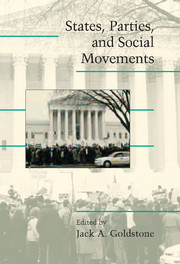Book contents
- Frontmatter
- Contents
- List of Figures and Tables
- Foreword
- Acknowledgments
- Contributors
- INTRODUCTION: BRIDGING INSTITUTIONALIZED AND NONINSTITUTIONALIZED POLITICS
- I States and Social Movements
- II Parties and Social Movements
- 5 PARTIES OUT OF MOVEMENTS: PARTY EMERGENCE IN POSTCOMMUNIST EASTERN EUROPE
- 6 FROM MOVEMENT TO PARTY TO GOVERNMENT: WHY SOCIAL POLICIES IN KERALA AND WEST BENGAL ARE SO DIFFERENT
- 7 PARTIES, MOVEMENTS, AND CONSTITUENCIES IN CATEGORIZING RACE: STATE-LEVEL OUTCOMES OF MULTIRACIAL CATEGORY LEGISLATION
- 8 PROTEST CYCLES AND PARTY POLITICS: THE EFFECTS OF ELITE ALLIES AND ANTAGONISTS ON STUDENT PROTEST IN THE UNITED STATES, 1930–1990
- Afterword: Agendas for Students of Social Movements
- References
- Index
6 - FROM MOVEMENT TO PARTY TO GOVERNMENT: WHY SOCIAL POLICIES IN KERALA AND WEST BENGAL ARE SO DIFFERENT
Published online by Cambridge University Press: 26 February 2010
- Frontmatter
- Contents
- List of Figures and Tables
- Foreword
- Acknowledgments
- Contributors
- INTRODUCTION: BRIDGING INSTITUTIONALIZED AND NONINSTITUTIONALIZED POLITICS
- I States and Social Movements
- II Parties and Social Movements
- 5 PARTIES OUT OF MOVEMENTS: PARTY EMERGENCE IN POSTCOMMUNIST EASTERN EUROPE
- 6 FROM MOVEMENT TO PARTY TO GOVERNMENT: WHY SOCIAL POLICIES IN KERALA AND WEST BENGAL ARE SO DIFFERENT
- 7 PARTIES, MOVEMENTS, AND CONSTITUENCIES IN CATEGORIZING RACE: STATE-LEVEL OUTCOMES OF MULTIRACIAL CATEGORY LEGISLATION
- 8 PROTEST CYCLES AND PARTY POLITICS: THE EFFECTS OF ELITE ALLIES AND ANTAGONISTS ON STUDENT PROTEST IN THE UNITED STATES, 1930–1990
- Afterword: Agendas for Students of Social Movements
- References
- Index
Summary
Can the relationship between parties and movements explain variations in the social policy agenda of governments? This essay attempts to answer this question by addressing a heretofore neglected puzzle in Indian politics. Why has the same leftist political party, which has dominated the political scene in the two Indian states of Kerala and West Bengal since Independence in 1947, implemented far-reaching social policies in one of these states but not in the other? I will argue that the differences in policies reflect historical differences in social movement–party dynamics during the later stages of the Indian nationalist independence movement, from roughly 1920 until 1947. These dynamics created different relationships between the party and civil society in the two states. In Kerala, leftists undertook grassroots organizing and captured political power considerably earlier than in West Bengal, and became deeply engaged in an agenda for antipoverty reforms that was not easily set aside for electoral concerns. In West Bengal, the left party came to power later, with leaders who were far more isolated from popular movements; these leaders focused first on securing political power and less on social reform. By taking a historical perspective on these outcomes, I open up the black box of party decision making to show how policy evolution depended not only on party ideology or on structural constraints, but also on the historically specific contexts of social movement dynamics in Kerala and West Bengal during the late nationalist period.
- Type
- Chapter
- Information
- States, Parties, and Social Movements , pp. 170 - 196Publisher: Cambridge University PressPrint publication year: 2003
- 4
- Cited by



